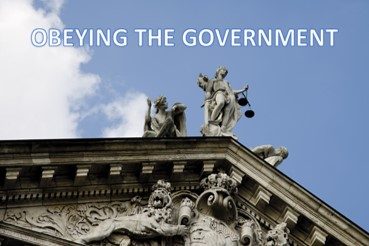
Introduction
‘Let everyone be subject to the governing authorities, for there is no authority except that which God has established. The authorities that exist have been established by God. Consequently, whoever rebels against the authority is rebelling against what God has instituted, and those who do so will bring judgment on themselves. For rulers hold no terror for those who do right, but for those who do wrong. Do you want to be free from fear of the one in authority? Then do what is right and you will be commended. For the one in authority is God’s servant for your good. But if you do wrong, be afraid, for rulers do not bear the sword for no reason. They are God’s servants, agents of wrath to bring punishment on the wrongdoer. Therefore, it is necessary to submit to the authorities, not only because of possible punishment but also as a matter of conscience. This is also why you pay taxes, for the authorities are God’s servants, who give their full time to governing. Give to everyone what you owe them: If you owe taxes, pay taxes; if revenue, then revenue; if respect, then respect; if honour, then honour.’ Romans 13:1-7
Whenever we seek to understand a letter, any letter, we should ask who wrote it, to whom he is writing, and why he is writing. If we fail to do this we are likely to forget that some letters are general letters, that contain advice, or messages, for all the churches, or groups of churches in whole regions, the letter to the Galatians is one of these, whilst others are written individual churches and deal with specific situations.
I am sure that this is something that we already understand because it is common sense, but it is easy to forget it and to make the mistake that Bible teachers used to call ‘stealing the promises’, taking a verse or passage or instruction out of context, and, as a consequence, misapplying it.
Now, with a passage such as Romans 13:1-7, which has certainly caused a great deal of discussion and debate, this is a mistake is easy to make, with the result that we find ourselves struggling to explain it.
Does Paul really mean that Christians must accept and obey every rule or regulation that is imposed by, say, an oppressive Government such as a tyrannical Government, or a dictatorship?
Governments are controlled by corrupt evil men who clearly have no hesitation in exploiting the people. The kind of Government that has power in North Korea, where absolute power is in the hands of a madman who has the people executed for the most trivial of reasons, and where human life apparently has no value.
Or, let’s come nearer home. Does this mean that we must submit to, and agree with, every decision, and law, passed by our own Government?
Must Christians submit to the demands of Government that violate their consciences because they require them to disobey the Law of God?
We have a Government, said to be Conservative, which has made same-sex, so-called marriages legal and which has made it a crime for Christian boarding-house keepers to refuse accommodation to homosexual couples.
Years ago, during the 2nd World War, a Labour Government took action against Christians whose consciences, taught by the Scriptures, prevented them from becoming soldiers and carrying a gun. There were many members of the church who found themselves having to refuse a Government demand.
In a sentence, does Paul mean that Christians must obey every government, no matter how bad? This is not what Paul was advocating, and it isn’t what the Scriptures teach.
In every age, there have been those who have found it necessary to refuse to obey a command issued by the reigning authority and we read about them in both the Old and New Testaments.
In the Old Testament, we have the examples of Daniel, and three men, Shadrach, Meshack and Abednego, who refuse to obey the Ruler in Babylon. In the New Testament, we read that the apostles were arraigned before the Jewish rulers for disobeying their command which forbade speaking about Jesus.
The response of Peter is classic, ‘We ought to obey God rather than men.’ Acts 5:29. Just a day or so earlier Peter had said to these same rulers, ‘whether it is right in the sight of God to listen to you more than to God, you judge’. Acts 4:19-20.
In fact, Sir William Blackstone who wrote, ‘commentaries on the law of England,’ a standard of reference, in legal matters, said, ‘an enactment is not a law if it conflicts with the law of God’. And I believe that!
What then, does Paul mean? He doesn’t endorse or approve of wicked rulers, or evil Governments. He means that God has decreed that Mankind should be governed. He is endorsing the principle of Human Government because the only other alternative is anarchy and lawlessness.
The Book of Judges records that after the death of Joshua, there was no one of his calibre to take over the leadership of the Children of Israel, and the result was Anarchy. We are told, that ‘every man did that which was right in his own eyes.’ Judges 21:25
Lawlessness!
And the result was one of the most frightening periods in Israel’s history, as the Book of Judges reveals.